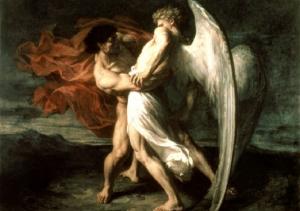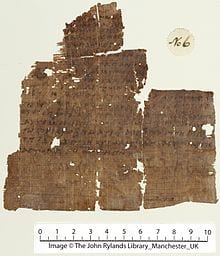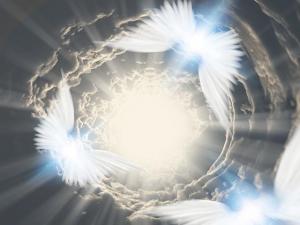
The highly symbolic angels of Church teaching and lore give us a clue to the meaning of that abundant reality that the Creed refers to with its “things visible and invisible.” But people have taken angels literally and the result is that angels no longer challenge us with the mystery of one reality. We too easily imagine another, invisible world when this one seems too much for us. We’ve domesticated angels into themes for country western songs.
Our angel stories are very tame compared to the ones you find in the Bible or in the Church’s subsequent traditions. In the Bible’s first book you find angels that wave a fiery sword at the entrance to the Garden of Eden. Another angel wrestles with Jacob and dislocates his hip. In the last book angels are charged with destroying the earth and the heavens. In other stories angels often scare the people to whom they appear. And these are good angels!
War in heaven?
The first story with bad angels, or devils, that I learned was about a war in heaven:
Lucifer was the most beautiful of God’s angels. This was before there was a universe. Angels had the duty and joy of reflecting God’s goodness and beauty, but Lucifer wasn’t content with that role. The most beautiful of God’s creation so far, he wanted the glory to be his own. So he rebelled.
Michael the Archangel led a host of loyal angels against Lucifer and his like-minded minions and drove them out of heaven. They were forced to make their home in the fiery depths of hell. From there they have been making sorties into our world ever since it was created. They try to turn us also away from God and get us to serve and glorify them. Guardian angels and, occasionally, archangels intervene in the world for our welfare and to carry out God’s will.
Having grown up with this story, I reacted with disbelief the first time someone told me that it’s not in the Bible. Searching the Bible for myself, I found similar stories but nothing really the same. The Book of Revelation tells about a war in heaven alright. But even if you take this story literally, it couldn’t be about the origin of devils. This story takes place in the distant future. Isaiah 14 and Ezekiel 28 each describe what may seem to be the fall of a heavenly being, but the context makes it clear that the descriptions are about, respectively, the king of Babylon and the king of Tyre.
The Second Book of Peter (2:4) and Jude (6) tell about angels who sinned and were sent to Tartarus or bound in chains. That may refer to the story in Genesis (6:1-4) about the origin of the Nephilim. The “sons of heaven” took the daughters of men for wives and begot these “heroes of old.” The story is so odd as to be almost impossible to interpret. It seems to have started out as a bit of Pagan lore that made it into the Bible.
Angels and the cosmos
I’m suspicious of stories about adventures and misadventures in heaven. The one God didn’t create two worlds or write two stories. Our ancestors in faith, the Jews, came to believe in one God by owning one story that connects all of history and world. It meant the hard realization that, even when captive in Babylon, they were part of Yahweh’s story, and Yahweh was punishing them. Their enemies were equally in Yahweh’s story, not the protagonists of another story with some other, more powerful God.
As I see it, belief in one God does not fit well with belief in two independent stories, whether they are about different kingdoms on earth or about one heavenly and one worldly kingdom. God has a single story, not one for angels and one for people. Karl Rahner, I believe, has the same thought about angels and the world:
Their relation to the world, which is both material and spiritual, must be thought of in such a way that they are really understood to be “principalities and powers” of the cosmos in virtue of their very nature…. (My emphasis. Passage is from Rahner’s A Concise Encyclopedia of Theology, pp 11-13, quoted by Chrystal on her blog called “Perspective: Thoughts of a Catholic convert.” (http://povcrystal.blogspot.com/)
Angels don’t belong to another world with a story different from ours. There aren’t two stories that touch each other in a few, or even many, places. Rahner’s idea of angels as “principalities and powers” of the cosmos is worth pursuing further.
Angels and gods
For St. Paul angels—and demons too—are creatures very much involved in this world. Later Christian traditions envisioned angels in nine choirs, a picture that draws on more than the Bible. These angels look a lot like some Pagan gods of the natural and human world.
The following table compares Greek or Roman mythological beings with Christian angelic choirs. The descriptions of the angelic choirs are from Wikipedia and Catholic Online:
|
Mythological beings |
Christian angels |
| Aphrodite (Venus), Goddess of Love | Seraphim. They are attendants or guardians before God’s throne. They burn eternally from love and zeal for God. |
| Apollos (Sun), God of Wisdom | Cherubim. They have intimate knowledge of God and continually praise Him. |
| The Demiurge (a mythical being in one of Plato’s philosophical dialogues.) He constructs the world by putting eternal forms into previously formless matter. | Thrones. They reside in the area of the cosmos where material form begins to take shape. |
| Zeus (Jupiter), King of the Gods | Dominions. They regulate the duties of the angels, making known the commands of God. They are the angels that preside over nations. |
| Various gods of the sun and planets. Astrology assigns different metals to different planets, e.g., iron to Mars. | Virtues. They are spirits of motion and control the elements. The virtues govern all nature. They have control over seasons, stars, moon, sun, planets, keeping the cosmos in order. |
| Ares (Mars), God of War and Chronos (Saturn), God of Time. | Powers. They are warrior angels, who fight against evil spirits. They are the bearers of conscience and keepers of history. |
| The Muses, goddesses who preside over the arts and sciences. | Principalities. They bequeath blessings to the material world. Principalities are the educators and guardians of the realm of earth. They inspire the arts and sciences. |
| Hermes (Mercury), Messenger God | Archangels. They are God’s messengers. They are the ones most frequently mentioned in the Bible. Michael, Gabriel, and Raphael are archangels. |
| Plato’s demon. (Another myth in a philosophical work.) This spirit warned Plato when he was in moral danger. | Just plain angels. They are closest to human beings. Angels deliver our prayers to God and God’s answers to us. They are the most solicitous over human needs and try to keep us out of moral trouble. |
The parallels aren’t exact, but close enough, I think, to indicate a lot of borrowing. Though Jews and Christians demythologized the Pagan gods, there was still a lot of spiritual power left in their view of the world.
About good and bad angels
Karl Rahner tells us not to take these choirs of angels literally. Still, I rather like them. They express how closely related angels are to the material world. All of them are good creations of God. Mythology aside, they express the fact that the universe makes sense and supports life. And they relate to other facts closer to home – that language, history, and communities from small to great make us what we are.
In the last post I linked angels, bad angels that is, with patterns, structures, systems, institutions, ideologies, ways of thinking and using language, and roles in human society. These larger than life realities have power over us. We have made them, but we live inside them. From them come attitudes, habits of action, and ways of thinking that are almost automatic. Like the air we breathe, we don’t notice their presence. A devil whispering temptations in the ear could not be more subtle than these. They are the reason why many unloving things are done and said, without knowing it, by ordinary, loving people.
But these too are among God’s good creations. We couldn’t live without them. That they can also be destructive of human welfare is a matter of common experience. How does that happen? How do these larger-than-life realities turn from good to evil? What does the Bible say?
Looking ahead
The next post will turn to the thought of Walter Wink, a Methodist Bible scholar and activist in non-violent resistance movements. He has made a thorough study of the New Testament’s language about the powers. Paul has a lot to say about bad angels. They are “the powers that be.” We need to name them, and the New Testament helps us do that. In today’s political and economic environment, we need often to resist them.
Wink’s analysis, especially of the malignant forces pervading institutions and customs, is helpful. In the end, though, Wink’s angels seem to depend too much on human creations for their dwelling places. Eventually, I will have to look somewhere else for a more complete view of angels.
Image credit: Thoughtco via Google Images












